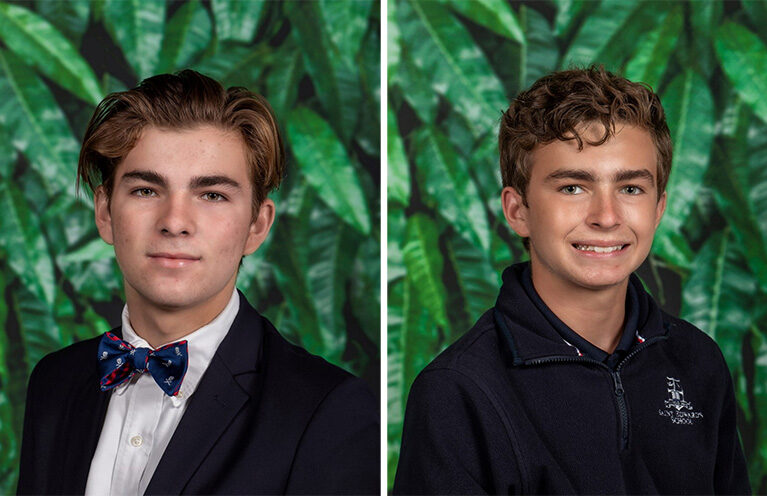
Saint Edward’s School added some luster to its academic reputation recently when two of its students took top honors in the 29th Annual Indian River Regional Science & Engineering Virtual Fair, with Best of Show awards going to Oscar Lindenthal in the senior division and Noah Hernandez in the junior division.
Lindenthal’s project, which focused on the effects of microplastic in the environment on living creatures, was good enough to get him a cash prize, entry into other higher-level science and engineering fairs, and $80,000 in scholarship money from Florida Institute of Technology.
Recent studies have shown an alarming amount of microplastics in the Indian River Lagoon and Lindenthal wondered how that might affect the health of lagoon inhabitants and nearby humans.
He chose fruit flies as his subjects because they are a relatively easy organism to study due to ease of storage and a short reproductive cycle, but he also noted that fruit flies have genes similar to humans. “If these impacts affect the fruit flies, they could potentially have similar effects on human beings.”
Lindenthal, a junior, has been a student at Saint Edward’s School since pre-kindergarten and hopes to attend a college with a strong pre-med program with plans to pursue a career in medicine or scientific research.
“I’m very curious; and when I have a question, I need to find an answer to that question. I feel like that’s what drives me,” said Lindenthal when asked about his affinity for science.
“My research shows that we only know a small sliver of what potentially is out there. To stay safe, we need to reduce pollution and reduce throwing microplastics into terrestrial and marine ecosystems. We don’t know what the potential impact will be in 100 years,” said Lindenthal, summarizing what he learned from his project.
Eighth-grade student Noah Hernandez has attended Saint Edward’s School for about four years after having transferred from Beachland Elementary, the only other school on the barrier island.
Hernandez was required to submit a project as part of his science honors class curriculum. However, he said he probably would have participated anyway, given his plan to pursue a career in particle physics.
“How the universe works has always fascinated me. The idea that we can answer such a big question makes me want to help us understand how our universe works and how we can use it to help us in the future,” he said.
Hernandez he chose his project topic – “The Effect of Current and Voltage on the Strength of an Electromagnet” – because of his interest in physics. “Magnetism and electricity combined make electromagnetism, a very important topic in physics,” he said.
Among other possible practical uses, Hernandez sees the need for stronger electromagnets for use with magnetic trains.
His project earned him an invitation to the State of Florida Science and Engineering Fair in March and a Broadcom Master’s Award, that includes an invite to a national science and engineering competition.
During a remote access awards ceremony, Doug Herron, Education Foundation of IRC executive director, congratulated the students, who, he notes, “overcame the obstacles of the times we live in, delivering top-notch projects that prove not even a pandemic can hold back inquisitive minds intent on exploring and understanding the world around them.”
In the past, all Saint Edward’s School students starting with fourth grade and up have been required to work on a long-term science question or investigation, explained Kerryane Monahan, Saint Edward’s School head of science. But given necessary health and safety limitations this year, the program was opt-in.
“Science fair and long-term investigation is a core tenet of our philosophy and our curriculum in the science department,” said Monahan. “The process of being at the science fair, communicating about work that you’ve done with adults who are often, if not experts in the field – and certainly have a different lens to view your work through – is such a powerful learning opportunity for the students, regardless of the project and how their project performs.”
Participating in a science fair is “really powerful,” according to Monahan, who said science literacy has always been critical, but is even more important now. “It’s a great opportunity for students to explore the kinds of sources that are out there and make good decisions about what’s credible and what’s not credible, to interpret data and what can be extracted from data and evidence and what cannot be, and how to draw conclusions without overgeneralizing.
“I want kids to be scientifically literate. I don’t need every kid to become a scientist, but I do need every kid to be capable of voting as a good citizen based on data and evidence. So, I feel like this plays an important citizenship role for them,” concluded Monahan.



